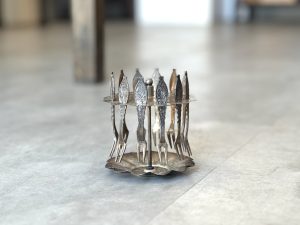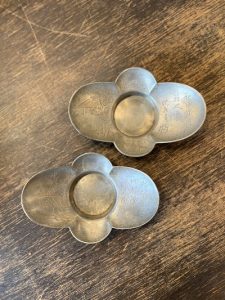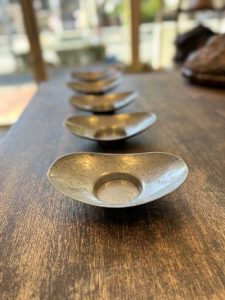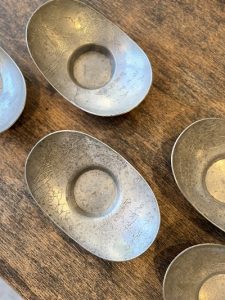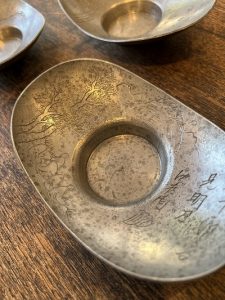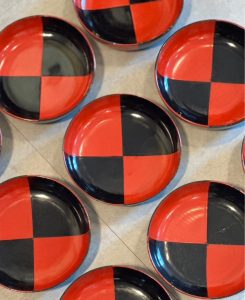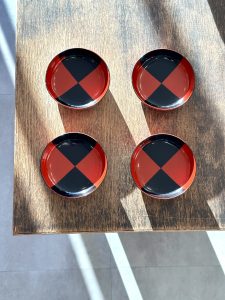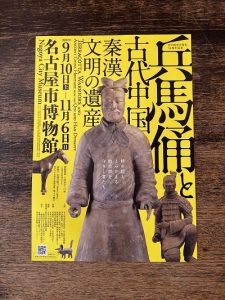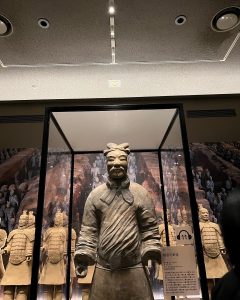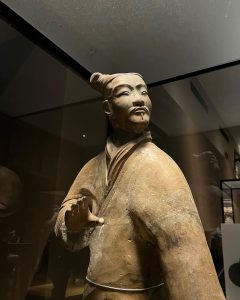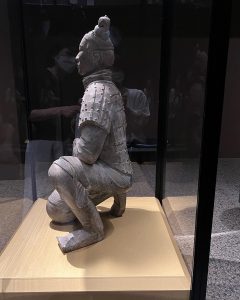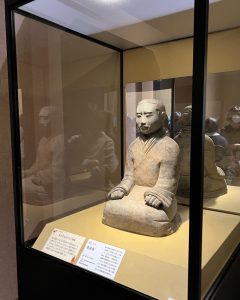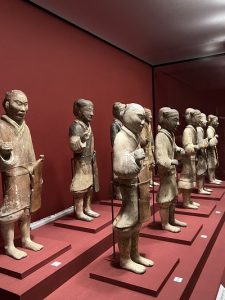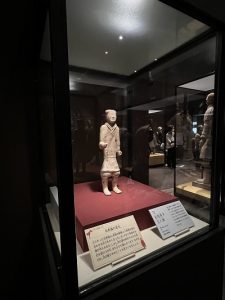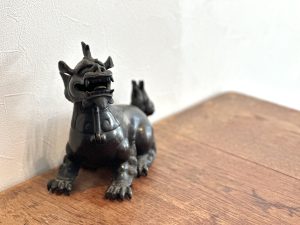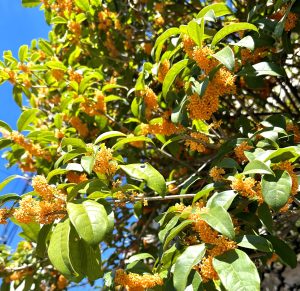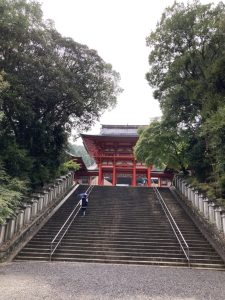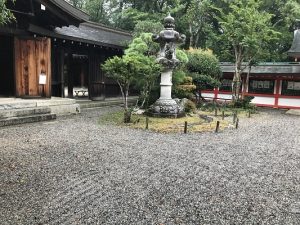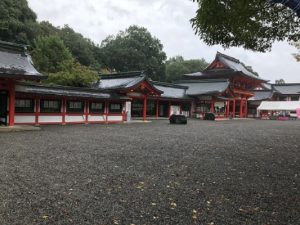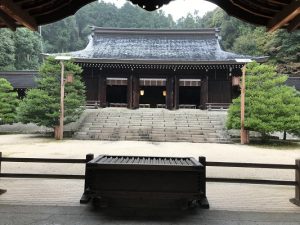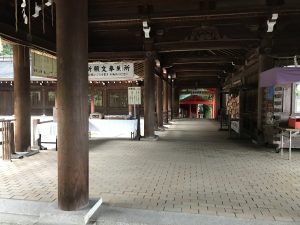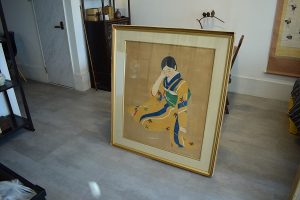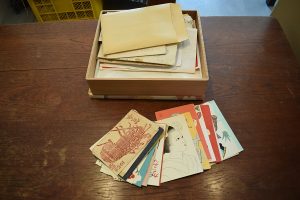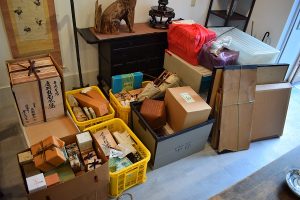神無月と神在月そしてえびす様(愛知県名古屋市千種区姫池通 骨董買取 古美術風光舎名古屋店)
2022.10.26
皆さま、こんにちは、スタッフMです。
この頃ニュースを見ていると旅行に行かれる方を多くお見受けします。10月より「全国旅行支援」の受付も開始し、すっかり秋晴れ、たしかにどこか出かけたいですよね!
私は昔から訪れてみたい場所がありまして…島根県・出雲大社です。
縁結びの神・福の神として名高い出雲大社(いずもおおやしろ)。
余談ですが、出雲大社=「いずもたいしゃ」だと思っていたのですが、本当は「おおやしろ」と呼ぶのですね。
出雲大社を参拝しようとすると1日はかかると言われています。また参拝の作法等も通常と異なりますので、行く前には予習が必要そう。
旅行に行くといっても、いつでもいいわけではなく訪れる時期と理由にもこだわりがありまして…
10月の別名:神無月
地域をはじめ、身の回りのさまざまなものを司る神様がみんな出雲へと向かってしまい、神様が不在であることから神無月(かんなづき)と呼ばれています。
なので島根県出雲地方では逆に神在月(かみありづき)と呼ばれます。全国から神様が集まってくることからの呼び名です。
旧暦10月10日の夜、出雲大社から海へと西へ1kmほど向かったところにある稲佐の浜では多くの神職や氏子が集まり、海からやってくる八百万の神様を迎える行事、神迎祭が行われるそうです。
篝火と祝詞がなんとも厳粛な雰囲気を出すそうで、現在はコロナのため見学不可となっていますが一度は直接見てみたいと思っている行事の一つです。
そこで出雲大社に集まった神様によって、様々な取り決めについて話し合う神様サミットが開かれるのだとか。出雲大社は昔から縁結びで有名とされているので、もしかしたら縁結びを願いに来た私たちの恋バナで盛り上がっていたりして…(笑)
では、そんな出雲大社で神様サミットが行われている間、その他の地方には神様が留守にしている!?と心配された方、ご安心ください。
実は、出雲大社に参集される神様は、山野や河川などに住む「国津神(くにつかみ)」と言われていて、高天原から降臨された「天津神(あまつかみ)」はお留守番されています。
また日本の神で、現在では七福神の一員として日本古来唯一の福の神、恵比寿様もお留守番されているそうなのです。恵比寿様がいらっしゃるのであれば、とっても安心ですよね。
そういえば、10月は「えびす講」を行う時期ですが、神無月・神在月とこれまた関係がありまして、
留守番をしてくださる恵比寿様に感謝し、五穀豊穣、商売繁盛等を祈願することが「えびす講」の由来と言われています。
愛知県では熱田神宮にて「えびす講」が行われるそうですが、毎年年明け1月頃に行われるそうです。名称も「初えびす」と呼ばれ、商売繁盛、家内安全、漁業豊漁を祈るお祭りとして大賑わいになります。
そして「初えびす」でお札を受けたあとは、福を逃がさないよう、誰とも口をきかず、寄り道もせず
一目散に家に帰らなくてはいけないという奇習も伝えられているのだとか。
他で行われる「えびす講」とは少し時期も異なりますが、感謝の気持ちを伝える機会というのは変わりありませんね。
当店にも黄金に輝くえびす様がいらっしゃいまして、いつも私たちスタッフ、そしてお店、またお店の前を通りかかるたくさんの人々を見守ってくださっています。
そんな日頃の感謝を伝えつつ、これからも風光舎が皆さまに愛されますようにと願って。
では。
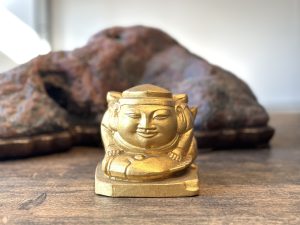
Hello everyone, this is Staff M.
When I watch the news these days, I see a lot of people going on trips. From October, we will start accepting applications for “National Travel Assistance”.
There’s a place I’ve always wanted to visit…Izumo Taisha Shrine in Shimane Prefecture. Izumo Taisha is famous as the god of marriage and the god of good fortune. As an aside, I thought that Izumo Taisha = “Izumo Taisha”, but it is actually called “Oyashiro”.
It is said that it takes one day to visit Izumo Taisha. Also, the etiquette of worshiping is different from usual, so it seems necessary to prepare before going. Even if you go on a trip, it doesn’t always mean that you can go on a trip.
Another name for October: Kannazuki It is called Kannazuki because all the gods who control the local area and other things around us have all gone to Izumo, and the gods are absent. Therefore, in the Izumo region of Shimane Prefecture, it is called Kamiarizuki. It is a name that comes from the fact that gods gather from all over the country.
On the night of October 10th in the lunar calendar, many Shinto priests and shrine parishioners gather at Inasa Beach, which is about 1km west of Izumo Taisha Shrine, to welcome the eight million gods coming from the sea. will be held. It seems that the bonfire and prayers create a solemn atmosphere, and although it is currently not possible to visit due to the coronavirus, it is one of the events that I would like to see in person.
It is said that the gods gathered at Izumo Taisha hold a summit to discuss various arrangements. Izumo Taisha has long been famous for its matchmaking, so maybe we came here to wish for a match, so it might have been exciting with our love banners.
Then, while the God Summit is being held at Izumo Taisha, God is away in other regions! ? If you are worried about it, please rest assured. In fact, the gods who gather at Izumo Taisha are said to be “Kunitsukami” who live in the mountains, fields and rivers, and “Amatsukami” who descended from Takamanohara is at home. It is also said that Ebisu-sama, the only Japanese god of good fortune from ancient times, who is currently one of the seven gods of good fortune, is also staying at home. If Ebisu-sama is here, it’s very reassuring.
Come to think of it, October is the time to hold Ebisuko, and it is also related to Kannazuki and Kamiarizuki. It is said that the origin of “Ebisuko” is to express gratitude to Ebisu-sama, who is an answering machine, and to pray for a bountiful harvest and prosperous business.
In Aichi Prefecture, “Ebisuko” is held at Atsuta Shrine, and it is said to be held around January every year. The name is also called “first Ebisu”, and it is a festival to pray for prosperous business, family safety, and a good catch of the fishery. And after receiving the talisman at “Hatsu Ebisu”, I don’t talk to anyone or take a detour so that I don’t lose my luck. It is said that there is also a strange custom that you have to go home as fast as you can. The timing is a little different from other Ebisuko events, but it’s still an opportunity to express your gratitude.
Our shop also has a shining golden Ebisu-sama, who is always watching over our staff, the store, and the many people who pass by the store. While conveying my daily gratitude, I hope that Fukousha will continue to be loved by everyone.
*********************
ご実家の整理やお片付けなどをされている方のご相談などが多くございます。
朝晩少々お寒くなってまいりましたので、お片付けなどくれぐれもご無理のないようになさってくださいませ。
風光舎では古美術品や骨董品の他にも絵画や宝石、趣味のお品など様々なジャンルのものを買受しております。
お片付けをされていて、こういうものでもいいのかしらと迷われているものでも、どうぞお気軽にご相談下さいませ。
また風光舎は、出張買取も強化しております。ご近所はもちろん、愛知県内、岐阜県、三重県その他の県へも出張いたします。
まずは、お電話お待ちしております。
愛知県名古屋市千種区姫池通
骨董 買取【古美術 風光舎 名古屋店】
TEL052(734)8444
10:00-17:00 OPEN
#神無月#神在月#えびす様#七福神#骨董品#買取

